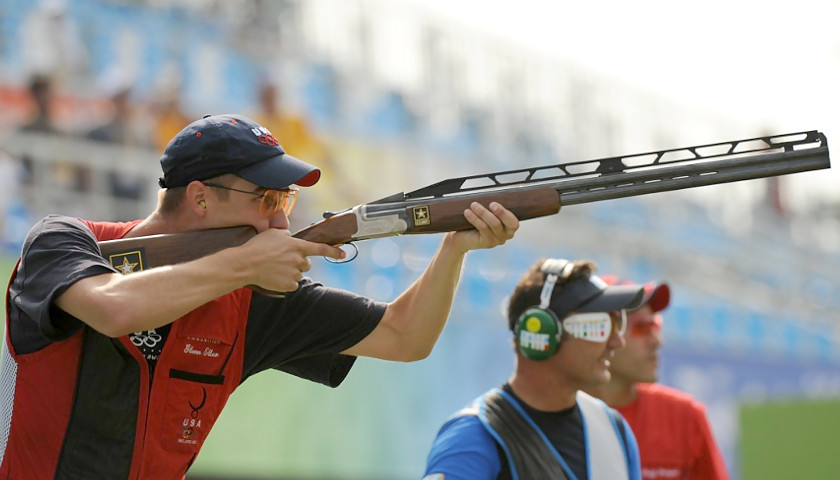by Kevin Daley
The Supreme Court heard arguments in a gun rights case for the first time in nearly 10 years Monday, involving a challenge to since-repealed New York City rules that greatly restricted the transportation of firearms.
Though the case is closely watched as a possible bellwether for future disputes over the Second Amendment, several members of the court, including Chief Justice John Roberts, seemed ready to dismiss the case for procedural reasons, without a decision on the contested New York regulations.
New York City’s gun transportation rules
Under a since-repealed ordinance, New York residents had to obtain a “premises license” from city authorities to lawfully possess a firearm. That license restricted possession to the address listed on the license itself. The transportation guidelines that license holders had to follow were before the high court Monday.
 Those rules provided that gun owners could carry their firearms to one of seven shooting ranges in the city. To do so, however, they had to keep their weapons in a locked container, with ammunition carried separately. They could not carry their guns past city lines. If they wished to transport weapons to any location besides an approved range, they had to obtain written permission from a city official.
Those rules provided that gun owners could carry their firearms to one of seven shooting ranges in the city. To do so, however, they had to keep their weapons in a locked container, with ammunition carried separately. They could not carry their guns past city lines. If they wished to transport weapons to any location besides an approved range, they had to obtain written permission from a city official.
Inspector Andrew Lunetta, who leads the New York City Police Department License Division, submitted an affidavit arguing those restrictions promote public safety. Without precise transportation rules, Lunetta fears premises license holders might carry their weapons all around the city without good reason, thereby raising the odds of gun violence.
“Investigations have revealed a large volume and pattern of premises license holders who are found in possession of their handguns in violation of the restrictions on their license,” Lunetta said.
“Public safety compels that these restrictions be effectively monitored and enforced, and that the perception of effective monitoring be supported,” he added.
The plaintiffs in Monday’s case, Romolo Colantone, Jose Anthony Irizarry and Efrain Alvarez, are New York residents who wish to transport their weapons beyond city limits to shooting competitions and vacation homes for self-defense. The New York State Rifle and Pistol Association is also a plaintiff in the dispute.
The 2nd U.S. Circuit Court of Appeals said the restrictions the rules impose are “trivial.”
“New York has licensed the ownership and possession of firearms in their residences, where Second Amendment guarantees are at their zenith, and does nothing to limit their lawful use of those weapons in defense of hearth and home — the core protection of the Second Amendment,” Judge Gerard Lynch wrote in an opinion upholding the contested regulations.
After the Supreme Court decided to hear the case, the city relaxed its rules and asked the justices to dismiss the case as moot. That move is appropriate because New York’s amended regulations give the plaintiffs everything they sought in court, city lawyers argue. The city’s move was widely seen as an attempt to head off an adverse judgment, particularly one that could favor gun rights in future cases.
Supreme Court long silent on Second Amendment cases
The Supreme Court handed down a pair of landmark Second Amendment decisions in 2008 and 2010. In the first case, District of Columbia v. Heller, a five-justice majority ruled that the Second Amendment protects the right to keep firearms in the home for self-defense. Two years later in McDonald v. Chicago, the high court said the Heller decision also applies to the states.
In the near decade that followed McDonald, however, the high court did not hear arguments in a single Second Amendment case, turning down a slew of appeals involving concealed carry permits, zoning laws that burden firearms vendors, and the gun rights of former felons. The court’s continued silence on the subject was especially frustrating to gun rights advocates, who have fared poorly in the lower courts in recent years.
“Over the past decade, the Supreme Court has said nothing about the scope of the Second Amendment,” South Texas College of Law professor Josh Blackman told the Daily Caller News Foundation. “During that period, the lower courts have taken the lead, and narrowly construed the right to keep and bear arms. Now, the Supreme Court can clarify whether the right extends beyond the home, and how courts should scrutinize gun control regulations.”
“However, I expect the Court to dismiss the New York case, as the controversy is now moot,” Blackman added.
Justices Clarence Thomas and Neil Gorsuch accused their colleagues of treating the Second Amendment as “a disfavored right” in a 2017 dissent, after the court refused to hear an appeal in a firearms case from California.
“For those of us who work in marbled halls, guarded constantly by a vigilant and dedicated police force, the guarantees of the Second Amendment might seem antiquated and superfluous,” Thomas wrote. “But the framers made a clear choice: They reserved to all Americans the right to bear arms for self-defense. I do not think we should stand by idly while a state denies its citizens that right, particularly when their very lives may depend on it.”
Court-packing looms over mootness dispute
Democratic Sen. Sheldon Whitehouse of Rhode Island filed an amicus (or “friend of the court”) brief urging the justices to dismiss the case as moot. The brief warned that a pro-gun ruling could inflame the progressive push to expand the Supreme Court and broadly accused the justices of bending procedural rules to advance a conservative judicial agenda.
“The Supreme Court is not well. And the people know it. Perhaps the Court can heal itself before the public demands it be ‘restructured in order to reduce the influence of politics,’” Whitehouse wrote. “Particularly on the urgent issue of gun control, a nation desperately needs it to heal.”
Democratic Sens. Dick Durbin of Illinois, Kirsten Gillibrand of New York, Richard Blumenthal of Connecticut and Mazie Hirono of Hawaii joined the Whitehouse brief.
Judicial Watch, a conservative oversight group, filed an ethics complaint against Whitehouse with the Rhode Island Supreme Court in August. Senate Republicans sent a letter to the Supreme Court accusing Whitehouse and certain Democratic presidential candidates of threatening the justices with “political retribution.” The GOP lawmakers added that the number of justices will remain fixed at nine for as long as they serve.
The case is No. 18-280 New York State Rifle and Pistol Association v. City of New York.
– – –
Kevin Daley is a reporter at Daily Caller News Foundation.





Well, Well, it’s beginning to look like we’ll have to put up signs all across America as they did in Berlin,
“You are now leaving the American Sector”.
to warn people if they are in a Territory still under the Constitution or one where the Constitution doesn’t apply each time they cross a County or State line.
Personally, I think we need another good old fashion “Civil wars”. and restore the Constitution “Coast to Coast”, “Border to Border”.
I’m already, “READY”.